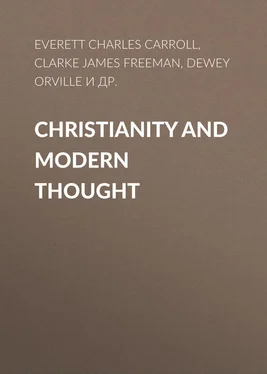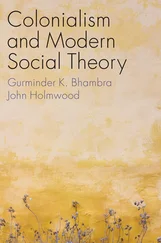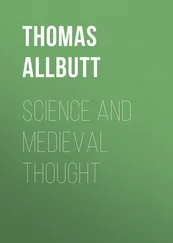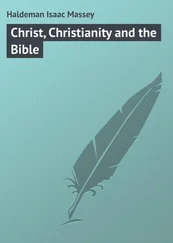Andrew Peabody - Christianity and Modern Thought
Здесь есть возможность читать онлайн «Andrew Peabody - Christianity and Modern Thought» — ознакомительный отрывок электронной книги совершенно бесплатно, а после прочтения отрывка купить полную версию. В некоторых случаях можно слушать аудио, скачать через торрент в формате fb2 и присутствует краткое содержание. Жанр: foreign_antique, foreign_prose, на английском языке. Описание произведения, (предисловие) а так же отзывы посетителей доступны на портале библиотеки ЛибКат.
- Название:Christianity and Modern Thought
- Автор:
- Жанр:
- Год:неизвестен
- ISBN:нет данных
- Рейтинг книги:5 / 5. Голосов: 1
-
Избранное:Добавить в избранное
- Отзывы:
-
Ваша оценка:
- 100
- 1
- 2
- 3
- 4
- 5
Christianity and Modern Thought: краткое содержание, описание и аннотация
Предлагаем к чтению аннотацию, описание, краткое содержание или предисловие (зависит от того, что написал сам автор книги «Christianity and Modern Thought»). Если вы не нашли необходимую информацию о книге — напишите в комментариях, мы постараемся отыскать её.
Christianity and Modern Thought — читать онлайн ознакомительный отрывок
Ниже представлен текст книги, разбитый по страницам. Система сохранения места последней прочитанной страницы, позволяет с удобством читать онлайн бесплатно книгу «Christianity and Modern Thought», без необходимости каждый раз заново искать на чём Вы остановились. Поставьте закладку, и сможете в любой момент перейти на страницу, на которой закончили чтение.
Интервал:
Закладка:
Conscience, like religion, is man's strength, and his weakness. Conscience makes cowards of us all; but it is the strong-siding champion which makes heroes of us all. Savages are cruel, pirates are cruel; but they cannot be as cruel as a good man, with a misguided conscience. The most savage heart has some touch of human kindness left in it, which nothing can quite conquer, – nothing but conscience. That can make man as hard as Alpine rock, as cold as Greenland ice. The torture-rooms and autos da fe of the Inquisition surpass the cruelties of the North American Indian. The cruelties of instinct are faint compared with the cruelties of conscience. Now what guides conscience to good or to evil? Theology, in the form of Ethics, is the guide of conscience. For, as soon as man believes in a God, he believes in the authority of his God to direct and control his actions. Whatever his God tells him to do must be right for him to do. Therefore religion in its inward form is either a debasing and tormenting superstition or a glad faith, according to the Theology with which it is associated. And religion, in its outward form, is either an impure and cruel despotism or an elevating morality, according to the idea of God and Duty which guide it; that is, according to its associated Theology.
Some persons, like Lucretius, seeing the evils of Superstition, Bigotry, and Fanaticism, and perceiving that these have their root in religion, have endeavored to uproot religion itself. But could this be effected, which is impossible, it would be like wishing to get rid of the atmosphere, because it is sometimes subject to tempests, and sometimes infected with malaria. Religion is the atmosphere of the soul, necessary to the healthful action of its life, to be purified, but not renounced.
Every one has a Theology, who has even a vague idea of a God; and every one has this who has an idea of something higher and better than himself, higher and better than any of his fellow-men. The Atheist therefore may have a God, though he does not call him so. For God is not a word, not a sound: he is the Infinite Reality which we see, more or less dimly, more or less truly, rising above us, and above all our race. The nature of this ideal determines for each of us what we believe to be right or wrong; and so it is that our Theology rules our conscience, and that our conscience determines with more or less supremacy the tendency and stress of our life.
No one can look at the History of the Human Race without seeing what an immense influence religion has had in human affairs. Every race or nation which has left its mark on Human Progress has itself been under the commanding control of some great religion. The ancient civilization of India was penetrated to the core by the institutions of Brahmanism; the grand development of Egyptian knowledge was guided by its priesthood; the culture of China has been the meek disciple of Confucius for two thousand years. Whenever any nation emerges out of darkness into light, – Assyria, Persia, Greece, or Rome, – it comes guided and inspired by some mighty religion. The testimony of History is that religion is the most potent of all the powers which move and govern human action.
Such is the story of the past. How is it at the present time? Has mankind outgrown the influence of religion to-day? Has the spread of knowledge, the advance of science, the development of literature, art, culture, weakened its power in Christendom? Never was there so much of time, thought, effort, wealth, consecrated to the Christian Church as there is now. Both branches of that Church, the Catholic and Protestant, are probably stronger to-day than they ever were before. Some few persons can live apart from religious institutions; but mankind cannot dispense with religion, and they need it organized into a Church or Churches.
Religion is a great power, and will remain so. But what is to determine the character of this power? It may impede progress or advance it; it may encourage thought or repress it; it may diffuse knowledge or limit it; it may make men free or hold them as slaves; it may be a generous, manly, free, and moral religion or a narrow, bigoted, intolerant, fanatical, sectarian, persecuting superstition. It has been both: it is both to-day. What is to decide which it shall be? I answer, its Theology; the views it holds concerning God, man, duty, immortality, the way and the means of salvation. Religion is an immense power: how that power is to be directed depends on Theology.
Proceeding then with my theme, I shall endeavor to show how false ideas in Theology tend to check the progress of humanity, and afterward how true ideas always carry mankind onward along an ascending path of improvement.
But first let me say that my criticism is of ideas, not of sects, churches, nor individuals. By a true Theology, I mean neither a Unitarian nor a Trinitarian Theology, neither a Catholic nor a Protestant Theology. I do not mean Calvinism nor Arminianism. I have nothing to say concerning these distinctions, however important they may be; and I, for one, consider them important. But I refer to a distinction more important still, lying back of these distinctions, lying beneath them; a difference not of opinions so much as of ideas and spirit.
By a true Theology, I mean a manly Theology, as opposed to a childish one; a free, as opposed to a servile one; a generous, as opposed to a selfish one; a reasonable and intelligent Theology, as opposed to a superstitious one.
By a true Theology, I mean one which regards God as a father, and man as a brother; which looks upon this life as a preparation for a higher; which believes that God gives us freedom, inspires our reason, and is the author of whatever is generous, self-forgetting, and noble. I find something of this Theology in all sects and churches; from the Roman Catholic at one extreme, to the Universalists and Unitarians, the Spiritualists and Come-outers, at the other. And the opposite, the false Theology, dishonorable to God, degrading to man, I find in all sects, and accompanying all creeds. And if I shall show, as truth compels me to show, that certain parties and persons are specially exposed to danger in one or another direction, I wish distinctly to state my belief that sincere and earnest men continually rise above the contagion of their position, and live untainted in an atmosphere which may have in it some special tendency to disease.
One false idea in Theology, which opposes human progress, is that Pantheistic view of the Deity, which loses sight of his personality, and conceives of him as a blind, infinite force, pervading all Nature, and carrying on the universe, but without intelligence and without love.
I know indeed that many views have been accused of being Pantheism which are not. I do not believe in a God outside of the universe. I believe that he is one "in whom we live, and move, and have our being," one "from whom, and through whom, and to whom are all things," – a perpetual Creator, immanent in his world. But this view is quite consistent with a belief in his personal being, in his intelligent, conscious, loving purpose. Without such a belief, hope dies out of the heart; and without hope mankind loses the energy which creates progress. Unless we have an intelligent Friend who governs the universe, it will seem to be moving blindly on toward no divine end; and this thought eats out the courage of the soul.
In some poetical natures, as in the case of Shelley, this Pantheism takes the form of faith in a spirit of beauty, or love, or intellectual power, pervading all things. In more prosaic minds it becomes a belief in law, divorced from love. It turns the universe into a machine, worked by forces whose mutual action unfolds and carries on the magnificent Cosmos. Often this view comes, by way of a reaction, against an excessive Personality of Will. When the Christian Church speaks of the Deity as an Infinite Power outside of the world, who creates it and carries it on according to some contrivance, of which his own glory is the end, it is perhaps natural that men should go to the other extreme and omit person, will, and design from their conception of Deity. But thus they encounter other and opposite dangers.
Читать дальшеИнтервал:
Закладка:
Похожие книги на «Christianity and Modern Thought»
Представляем Вашему вниманию похожие книги на «Christianity and Modern Thought» списком для выбора. Мы отобрали схожую по названию и смыслу литературу в надежде предоставить читателям больше вариантов отыскать новые, интересные, ещё непрочитанные произведения.
Обсуждение, отзывы о книге «Christianity and Modern Thought» и просто собственные мнения читателей. Оставьте ваши комментарии, напишите, что Вы думаете о произведении, его смысле или главных героях. Укажите что конкретно понравилось, а что нет, и почему Вы так считаете.












